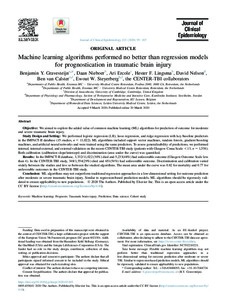| dc.contributor.author | Gravesteijn Benjamin Y | |
| dc.contributor.author | Steyerberg Ewout W; CENTER-TBI collaborators | |
| dc.contributor.author | Nelson David | |
| dc.contributor.author | Lingsma Hester F | |
| dc.contributor.author | van Calster Ben | |
| dc.contributor.author | Ercole Ari | |
| dc.contributor.author | Nieboer Daan | |
| dc.date.accessioned | 2022-10-28T13:38:14Z | |
| dc.date.available | 2022-10-28T13:38:14Z | |
| dc.identifier.uri | https://www.utupub.fi/handle/10024/166366 | |
| dc.description.abstract | <p>Objective</p><p>We aimed to explore the added value of common machine learning (ML) algorithms for prediction of outcome for moderate and severe traumatic brain injury.</p><p>Study Design and Setting<br /></p><p>We performed logistic regression (LR), lasso regression, and ridge regression with key baseline predictors in the IMPACT-II database (15 studies, <i>n</i> = 11,022). ML algorithms included support vector machines, random forests, gradient boosting machines, and artificial neural networks and were trained using the same predictors. To assess generalizability of predictions, we performed internal, internal-external, and external validation on the recent CENTER-TBI study (patients with Glasgow Coma Scale <13, <i>n</i> = 1,554). Both calibration (calibration slope/intercept) and discrimination (area under the curve) was quantified.</p><p>Results<br /></p><p>In the IMPACT-II database, 3,332/11,022 (30%) died and 5,233(48%) had unfavorable outcome (Glasgow Outcome Scale less than 4). In the CENTER-TBI study, 348/1,554(29%) died and 651(54%) had unfavorable outcome. Discrimination and calibration varied widely between the studies and less so between the studied algorithms. The mean area under the curve was 0.82 for mortality and 0.77 for unfavorable outcomes in the CENTER-TBI study.</p><p>Conclusion<br /></p><p>ML algorithms may not outperform traditional regression approaches in a low-dimensional setting for outcome prediction after moderate or severe traumatic brain injury. Similar to regression-based prediction models, ML algorithms should be rigorously validated to ensure applicability to new populations.</p> | |
| dc.language.iso | en | |
| dc.publisher | Elsevier | |
| dc.title | Machine learning algorithms performed no better than regression models for prognostication in traumatic brain injury | |
| dc.identifier.urn | URN:NBN:fi-fe2021042822658 | |
| dc.relation.volume | 122 | |
| dc.contributor.organization | fi=kliiniset neurotieteet|en=Clinical Neurosciences| | |
| dc.contributor.organization | fi=anestesiologia ja tehohoito|en=Anaesthesiology, Intensive Care, Emergency Care and Pain Medicine| | |
| dc.contributor.organization | fi=tyks, vsshp|en=tyks, vsshp| | |
| dc.contributor.organization-code | 2607314 | |
| dc.contributor.organization-code | 2607301 | |
| dc.converis.publication-id | 49991888 | |
| dc.converis.url | https://research.utu.fi/converis/portal/Publication/49991888 | |
| dc.format.pagerange | 95 | |
| dc.format.pagerange | 107 | |
| dc.identifier.eissn | 1878-5921 | |
| dc.identifier.jour-issn | 0895-4356 | |
| dc.okm.affiliatedauthor | Tenovuo, Olli | |
| dc.okm.affiliatedauthor | Takala, Riikka | |
| dc.okm.affiliatedauthor | Dataimport, tyks, vsshp | |
| dc.okm.affiliatedauthor | Posti, Jussi | |
| dc.okm.discipline | 3126 Kirurgia, anestesiologia, tehohoito, radiologia | fi_FI |
| dc.okm.discipline | 3126 Surgery, anesthesiology, intensive care, radiology | en_GB |
| dc.okm.internationalcopublication | international co-publication | |
| dc.okm.internationality | International publication | |
| dc.okm.type | Journal article | |
| dc.publisher.country | United States | en_GB |
| dc.publisher.country | Yhdysvallat (USA) | fi_FI |
| dc.publisher.country-code | US | |
| dc.relation.doi | 10.1016/j.jclinepi.2020.03.005 | |
| dc.relation.ispartofjournal | Journal of Clinical Epidemiology | |
| dc.year.issued | 2020 | |
